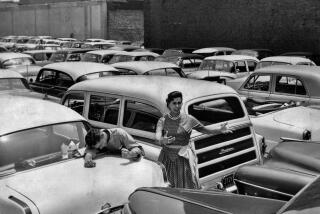Cheney Calls Ex-Friend O’Neill a ‘Big Disappointment’
In a new book about the Bush administration, former Treasury Secretary Paul H. O’Neill describes Vice President Dick Cheney as a leader of a “praetorian guard” around the president, cutting him off from dissenting opinions.
In his first public comments on the book, “The Price of Loyalty,” by journalist Ron Suskind, Cheney described O’Neill as “a big disappointment.”
“I was a big advocate of his, without question. And it’s turned out to be a big disappointment,” Cheney said in an interview with the Los Angeles Times and USA Today. “It’s too bad. I wish it hadn’t turned out that way.”
Cheney had long ties to O’Neill, having worked with him in the Nixon and Ford administrations, when O’Neill was a top official at the Office of Management and Budget. It was Cheney who recommended O’Neill for the job of Treasury secretary, and it was Cheney who in 2002 told O’Neill he was fired.
“I like Paul; I’ve known him for 30 years. We were friends. The relationship is a little strained now, partly because I also had to give him the word that his services were no longer needed,” Cheney said.
Cheney said O’Neill was picked as Treasury secretary because he had years of corporate experience as the chief executive of Alcoa, as well as an encyclopedic knowledge of the federal budget. But in the end, Cheney said, O’Neill didn’t mesh with the rest of the White House.
“It’s one of those things that happens periodically. You put a round peg in a square hole, and it didn’t work,” he said.
“This was a case where, clearly, it wasn’t working, it was time to make a change, so we made the change.”
“Paul has had his say,” Cheney added. “I disagree with his analysis, obviously. But he’s had his day. I feel badly for him, to some extent, that he has ended his career on this note. That’s his choice.”
The interview was conducted Thursday under a White House embargo that ended today.
*
(BEGIN TEXT OF INFOBOX)
‘I Think the Jury Is Still Out’
Excerpts from Vice President Dick Cheney’s interview with the Los Angeles Times and USA Today:
On the Democratic candidates for president:
“I think they’re having trouble, as I watch. I think they started out with an effort to try to use the economy against us. They’ve spent a lot of time talking about the economy. The economy’s looking pretty good. Things are currently moving in the right direction....
“I think the success we’ve enjoyed in Iraq, especially in recent weeks, [capturing] Saddam Hussein ... we’ve taken the wind out of their sails. As I look at the debate on Iraq ... there’s sometimes a bigger debate inside the Democratic Party between those who did support the war and those who didn’t than there is between us, the Republican side.... It’s a tougher issue for them to deal with.”
*
On the use of intelligence leading up to the war against Iraq:
“People want to go back and look at the intelligence ... in terms of did you have a case that would stand up in court, is it beyond a shadow of a doubt? Well, intelligence is almost never beyond a shadow of a doubt.... It’s rarely 100% complete.
“Occasionally you’ll find examples of history where somebody loses the plan for the battle on the battlefield, like at Antietam ... and there’s your adversary’s plan. That almost never happens these days.”
*
On Saddam Hussein’s alleged stores of weapons of mass destruction:
“I think the jury is still out.... We know he did, in fact, have [weapons of mass destruction] in the past, because he used it. And I think that we’ve got a lot of people over there now trying to find what happened to it.
“I think we need to think in terms of capabilities -- the capacity, for example, on short notice to produce biological weapons. The stuff is perishable and doesn’t last very long, anyway....
“I am a long way at this stage from concluding that somehow there was some fundamental flaw in our intelligence. If I look back at the Gulf War ’90 and ‘91, the problem then was that we missed some important capabilities. We underestimated, for example, how far he had gotten that time around with his nuclear weapons capabilities. He had a much more robust program than we knew about, and we didn’t find that out till after the ’91 Gulf War was over with. So, as I say, there’s still a lot of work to be done before we’ll be able to sit down and make a final definitive judgment on, we got it right here, or we missed it over here.”
*
On his relationship with the intelligence community:
“The intelligence community ... they’ve got to expect that they have [to] defend their analysis. They’ve got to be able to withstand the kind of questioning that goes with a good interchange back and forth. It’s got to be a two-way street. You’ve got to be able to say to the analysts, ‘Well, wait a minute, why did you conclude that?’ Or, ‘What are your underlying assumptions?’ And I do a lot of that. And I see that very much as part of my job.
“You don’t simply take what the community produces and say, ‘Oh, OK, this is gospel.’ It’s rarely gospel.”
*
On his tendency to use his influence behind the scenes:
“Publicity sometimes makes sense, but lots of times it doesn’t. And I’m in the unique position, since I really do believe that this is going to be sort of the last phase, if you will, of my public career, that I don’t have any reason to go out and worry about what may be said about me in the press, or what my image might be out there.
“I think people who know and that I need to worry about and whose views are important in terms of our ability to do the job have got a pretty good idea what I do, and that’s sufficient.”
More to Read
Sign up for our Book Club newsletter
Get the latest news, events and more from the Los Angeles Times Book Club, and help us get L.A. reading and talking.
You may occasionally receive promotional content from the Los Angeles Times.






